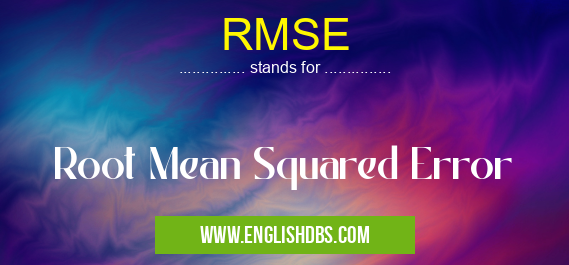What does RMSE mean in UNCLASSIFIED
Root Mean Squared Error (RMSE) is a measure of the difference between predicted and actual values. This metric provides a useful way to measure the accuracy of any given prediction model, such as regression models, time series models, classification and clustering algorithms. In other words, it quantifies the amount of error that remains after fitting the model to the data. RMSE provides a good indication of how well the model fits the data; smaller error values indicate better fit. For example, if we have 10 data points and our model makes predictions that are off by an average of 8 units from the true value for each point, then our RMSE value would be 8.

RMSE meaning in Unclassified in Miscellaneous
RMSE mostly used in an acronym Unclassified in Category Miscellaneous that means Root Mean Squared Error
Shorthand: RMSE,
Full Form: Root Mean Squared Error
For more information of "Root Mean Squared Error", see the section below.
Essential Questions and Answers on Root Mean Squared Error in "MISCELLANEOUS»UNFILED"
What is Root Mean Squared Error (RMSE)?
Root Mean Squared Error (RMSE) is a measure of how much error there is between predicted values and actual values for a given data set. It is the average of the square of all errors divided by the number of observations. It gives us an indication of how far off our predictions are from the actual values.
How is RMSE calculated?
RMSE is calculated by taking the square root of the mean of all squared errors in the dataset, divided by the number of observations. This formula is generally used to compare predicted values with actual observed values.
What does low RMSE indicate?
Low RMSE values indicate that our model predictions are closer to the actual observed results for that particular dataset. In other words, it suggests that our model has a good fit with the data.
What does high RMSE indicate?
High RMSE reflects poor model performance - meaning that our predictions are not close to the observed results for that particular dataset. This could be due to improper selection or tuning of parameters, overfitting or underfitting during training, or it could be an indication that something more complex needs to be done to better capture relationships in your data.
Is lower RMSE always better?
Not necessarily – while it’s true that lower RMSE means better performance in general, there can be cases where higher error scores can be beneficial in some situations (e.g., when dealing with highly complex datasets). Ultimately, it depends on your goal – so it’s important to have a clear understanding of what you want your model to achieve before choosing an optimization metric like RMSE.
What are some common uses for RMSE?
Common uses for Root Mean Squared Error include quantifying prediction accuracy in regression models, comparing different models during training and optimizing hyperparameters based on error scores. It can also be used as part of a larger metric such as AUC-ROC or Gini index which may incorporate additional context around false positives and negatives more than just pure accuracy metrics like MSE/RMSE do alone.
Can I use RMSE for classification problems?
While traditionally MSE/RMME have been used only in regression tasks, they can also work well for binary classification problems when combined with thresholds and other metrics like precision-recall curves or confusion matrices which allow you to assess model performance beyond just pure accuracy scores.
Does scaling make a difference when using RMSE?
Yes – if your data has features with different scales then it’s important to normalize them before fitting your model since large differences between feature ranges can greatly skew results. Also keep in mind that if you plan on regularizing (or penalizing) weights then scaling may negate any improvement gains resulting from this step unless all features are scaled appropriately.
Final Words:
In sum, Root Mean Squared Error (RMSE) is an important metric used for evaluating predictive models. It helps quantify how close or far away model predictions are from ground truths or expected outcomes; lower RMSE scores generally indicate better accuracy and higher scores indicate worse accuracy in comparison with ground truth data points. With this metric you can determine if your predictive model is performing as expected or if there are errors that need to be addressed in order to make more accurate predictions going forward.
